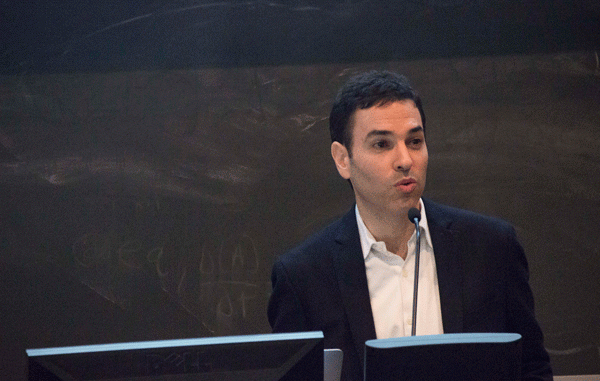
The world has developed a stigma against people who speak out against questionable actions. These people are often depicted as trouble makers, whose choice to ‘do the right thing’ might land them in jail, without a job or humiliated for life.
The next generation is entering a world filled with questionable actions all the time. Sometime in their lives, there is a likelihood that they may be forced to make decisions that betray their better judgement. However, there have been many individuals throughout time that have had the courage to stand up against their orders to follow their own hearts.
Eyal Press, an award-winning journalist and author of ethical and social justice novels, gave a lecture in the Honor’s Center on Tuesday, April 12 to talk about the choices and hardships faced by these individuals who have rejected their duty and responsibility to remain true to their values.
“Eyal Press has made debatable issues his specialty and his work transcends those familiar ways of thinking about conflict,” SUNY New Paltz President Donald P. Christian said. “His writing is intriguing and vivid, but also tests readers beyond their previously conceived notions of truth.”
Press is also this year’s James Ottaway Visiting Professor of Journalism. He is teaching a course titled “Reporting on Divisive Issues.”
Press’ father, who faced persecution for performing abortions, was used as an example to demonstrate the divisiveness of his father’s medical practice. Abortion is a highly contested issue, which frequently led to threats against Press’ father. The theme of divisiveness has been present through the actions of numerous individuals throughout history.
A man named Paul Grueninger was a police border guard in Switzerland during World War II who disobeyed his duties, for Jewish refugees to cross the border illegally so they had a chance for a future. The Germans found out, and the Switzerland authorities stripped Grueninger of his outfit and rank, forcing him to live his life in penury and disgrace.
But he was not alone. Another individual named Avner Wishnitzer was part of an elite unit in the Israeli army that learned of Palestinian farms that were being burned and vandalized inexcusably. Regarding these acts as criminal, Wishnitzer refused to serve anymore. This opposition got him kicked out of the army and branded a traitor by his own country.
“What I experienced was 10 times harder than the trials I have faced in the army,” Wishnitzer said. “When I risked my life for my country, I felt their presence like a wind on my back. But now, the wind is in my face.”
Another ‘Whistle-Blower’ in the present day commonly known as Edward Snowden, released information from the National Security Agency he felt was a violation of privacy. The government charged him with the Espionage Act for leaking information and he was forced to flee the country after being branded a wanted man and traitor.
Snowden is one of the most polarizing individuals of the present time, because he is regarded by some as a hero who courageously revealed corruption and others as a criminal who leaked information to enemies. Why does Snowden get a different treatment than other individuals did in the past? Press said the difference has to do with time.
“Three or four decades ago, people were not as interested in issues that raised questions because things were often seen as ‘black and white,’” Press said.
Future whistleblowers are divisive and polarizing figures for forcing attention to specific issues. Anyone who is a nonconformist to a cause is regarded as a ‘trouble causer’ to that structure of power they are challenging.
Press referred to the scandal at Penn State University with Jerry Sandusky, the longtime defensive coordinator who sexually abused children. This was something that had been going on at that school for some time and nobody came forward. Press posed the question to the audience of whether or not things would be different if someone did come forward and how they would be viewed.
“The divisive issues that are obvious expose the fault lines in our society,” Press said. “But sometimes it is the issues we think aren’t divisive that touch on the real double standards and hypocrisies we all want to believe are true.”
Press went on to address the two types of approaches people normally take when making decisions in the face of questionable circumstances, the ‘objectivity approach,’ where individuals don’t take sides in fear of opposition, or the ‘polarization approach,’ where individuals openly argue their opinions without fear of opposition. Press said that there is a third option.
This option is presenting information while at the same time trying to grapple with the facts to make the argument stronger. It is important to hear people out and listen to their points of view while putting yourself in their shoes. Each aforementioned individual has wrestled with their duties while putting themselves in other people’s shoes to determine what choice they should make.
“Nonconformity, is a result of putting ourselves in someone else’s shoes,” Press said. “We have a responsibility to put ourselves in people’s shoes, displaying our resolve from that is a true display of courage.”
